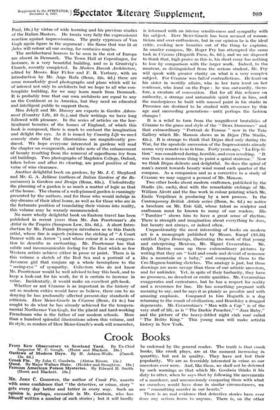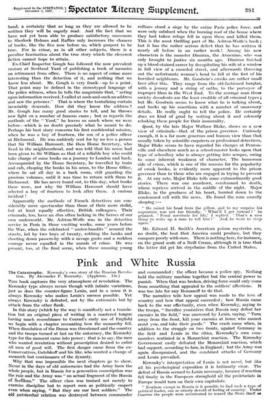Crook Books
From Kew Observatory to Scotland Yard. By Ex-Chief
Inspector W. C. Gough. (Hurst and Blackett. 18s.) Outlaws of Modern Days. By H. Ashton-Wolfe. (Cassell.
12s. 6d.) (Hurst and Blackett. 188.)
MR. JOHN C. GOODWIN, the author of Crook Pie, asserts with some confidence that " the detective, or crime, story " gets every day better and better in every way. Such an opinion is, perhaps, excusable in Mr. Goodwin, who .has Mosel' written a number of such stories ; but it will hardly be endorsed by the general reader. The truth is that crook books, like crook plays, are at the moment increasing in quantity, but not in quality. They have not lost their popularity. We are as feverishly interested in crime as our ancestors ever were. And, like them, we shall not be deterred by such warnings as that which Mr. Goodwin thinks it his duty to utter, when he says that by following the movements of a murderer, and unconsciously comparing them with what we ourselves would have done in similar circumstances, we are " committing murder in our hearts."
There is no real evidence that detective stories have ever done any serious harm to anyone. There is, on the other hand, a certainty that as long as they are allowed to be written they will be eagerly read. And the fact that we have not yet been able to produce satisfactory successors to Sherlock Holmes and Raffles only increases the chances of books, like the five now before us, which purport to be true. For, in crime, as in all other subjects, there is a peculiar fascination about the true story which the cleverest Action cannot hope to attain.
'Ex-Chief Inspector Gough has followed the now prevalent etstom at Scotland Yard of publishing a book of memoirs on retirement from office. There is no aspect of crime more interesting than the detection of it, and nothing that we know less about. Mr. Gough is very frank—up to a point. That point may be defined in the stereotyped language of the police witness, when he tells the magistrate that, " acting upon information received. I called at such-and-such an address and saw the prisoner." That is where the tantalizing curtain invariably descends. How did they know the address ? Mr. Gough has many good stories to tell, and he throws new light on a number of famous cases ; but as regards the methods of the " Yard," he leaves us much where we were before—which is no doubt precisely what he meant to do. Perhaps his best story concerns his first confidential mission, when he was a boy of fourteen, the son of a police officer at Richmond. He was suddenly sent for by no less a person that Sir William Harcourt, the then Home Secretary, who lived in the neighbourhood, and was told that his name had been given to Sir William as that of a reliable boy who could take charge of some books on a journey to London and back. Accompanied by the Home Secretary, he travelled by train and cab, clasping the books in his arms, to the Home Office, where he sat all day in a back room, still guarding the precious volumes, until it was time to return with them to Richmond. He has never found out, to this day, what books these were, nor why Sir William Harcourt should have selected a boy of fourteen to look after them. A curious incident !
Apparently the methods of French detectives are con- siderably more spectacular than those of their more stolid, but at least equally effective, British colleagues. Their criminals, too, have an elan often lacking in the heroes of our own underworld. Mr. Ashton-Wolfe was in the detective service in Paris in those exciting weeks, some years before the War, when the celebrated " motor-bandits " scoured the streets, led by two boys of twenty, robbing the hanks and shooting down passers-by with a savage gusto and a reckless courage never equalled in the annals of crime. He was present, too, at the final scene, when these amazing young
ruffians stood a siege by the entire Paris police force, and were only subdued when the burning roof of the house where they had taken refuge fell in upon them and killed them. This is the most thrilling part of Mr. Ashton-Wolfe's book ; but it has the rather serious defect that he has written it nearly all before in an earlier work ! Among his new characters is the monster Dimiran, the Armenian, wile was
only brought to justice six months ago. Dimiran finished up a blood-stained career by decapitating his wife at a window in full view of a crowded street, and afterwards throwing out the unfortunate woman's head to fall at the feet of his horrified neighbours. Mr. Goodwin's crooks are rather small beer after this. They range from the old-fashioned burglar, with a jemmy and a string of oaths, to the purveyor of improper films in the West End. To the average man these society decedents are the least credible of all criminal types ; but Mr. Goodwin seems to know what he is talking about, and hacks up his assertions with a number of unsavoury details. He really ought to tell the police. He certainly does no kind of good by writing about it and solemnly rebuking these people for their immorality, Quod, by the late Major Wallace Blake, shows us a new view of criminals—that of the prison governor. Curiously
enough, it is a far more generous and human view than that usually taken by scientific enquirers or professional detectives. Major Blake seems to have regarded his charges at Penton- ville and elsewhere much as a school-master looks upon that type of schoolboy who is always getting into scrapes, owing to some inherent weakness of character. The humorous side of crime, which is one of the reasons for the popularity of crook books, is evidently more apparent to the prison governor than to those who are engaged in trying to prevent it. At any rate, Major Blake tells some extraordinarily good stories. There was one murderer, condemned to death, whose reprieve arrived in the middle of the night. Major Blake, in the goodness of his heart, hurried down to the condemned cell with the news. He found the man soundly sleeping
He raised his head from the pillow, and to my surprise his expression was not too friendly. What'll I get instead ? ' he grunted. ` Penal servitude for life,' I replied. That's a nice thing to wake up a man to tell him ! ' And he went to sleep again."
Mr. Edward H. Smith's American poison mysteries are, no doubt, the best that America could produce, but they compare poorly with ours. There is nothing here, for instance, on the grand scale of a Neill Cream, although it is true that the latter did get his strychnine from the United States.











































































 Previous page
Previous page